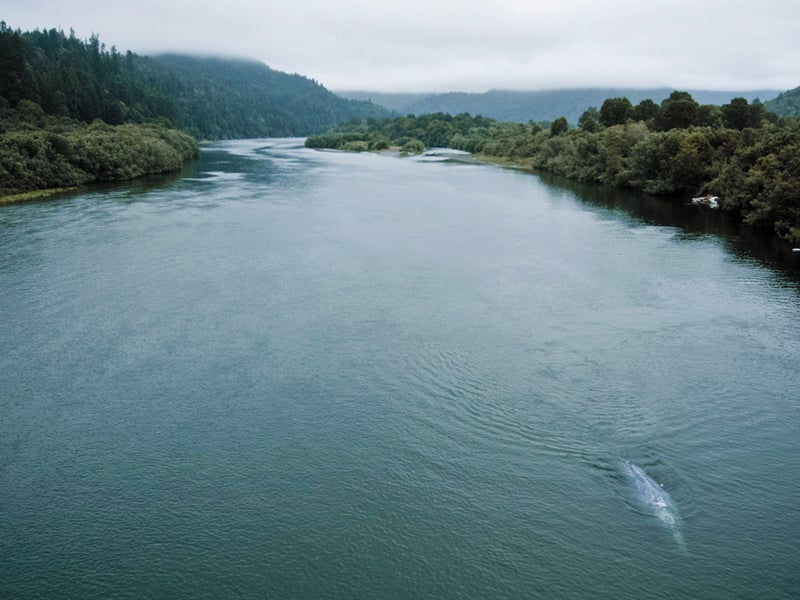‘We could not be idle while our fish were again under siege’
Poor water management on the Klamath River has caused a swift decline in salmon stocks, threatening the Yurok people’s livelihood.

This page was published 8 years ago. Find the latest on Earthjustice’s work.
Editor’s Note: This blog was originally published as an op-ed for the Eureka Times-Standard
If the salmon go, so do the Yurok people. This much we know.
We are a fishing people. We have lived along the banks of the Klamath River since time immemorial. Our creation story tells us that as long as we do not take more than we need from the River, it will always provide for us. Our tribe takes this responsibility — to live sustainably — very seriously.
We have managed our River for generations, living as a part of its ecosystem, according to this sacred covenant of sustainability. The River, full of fish, supported us for millennia. Salmon — Ney-puy in our language — are the foundation of our existence. They always have been.
Our reservation includes a small portion of our aboriginal territory in Northern California. It spans from the Mouth of the River at the Yurok Village of Requa, where my family is from, up the River for 44 miles. The Yurok Tribe, comprised of more than 6,100 members, is the largest federally recognized Indian Tribe in California. Consistent with our cultural values, we dedicate a significant share of our financial and human resources to the management of the Klamath, employing approximately 75 people for water quality monitoring, harvest regulation and watershed restoration activities.
The Tribe operates a sustainable commercial fishery of fall Chinook salmon. Each year the Tribal Council, in coordination with the federal and state governments, set a sustainable harvest allocation based on the number of returning salmon. For many tribal members, the money they make during our commercial fishery is the only income they earn all year. The commercial salmon season provides money to clothe and feed our families and keep the lights on. This makes the Klamath fishery an incredibly important economic resource for our tribal members.
In 2016, the Yurok Tribal Council, in response to a very small projected fish run, cancelled the commercial fishing season to protect future fish populations. The fish allocation was the second lowest on record, and not enough to provide each tribal member a single salmon. In the same year, the Tribe did not serve fish at the annual Klamath Salmon Festival, a first in the event’s 54-year history. In January 2017, the federal government issued a disaster declaration for the 2016 Yurok Tribe fishery.
We have experienced significant challenges due to the dwindling Klamath fishery, the cause of which is rooted in the river’s management. When diversion infrastructure and dams were constructed on the Klamath, it initiated a swift decline in salmon stocks. In 2002, a decision to reduce flows caused the most devastating event in modern Yurok history when over 34,000 adult salmon died from Ich, a disease that spread like wildfire in the low, warm river.
More recently, the Klamath salmon populations have been hit hard by another fish pathogen, Ceratonova Shasta. In 2014, 81 percent of sampled juvenile fish were infected with the disease. In 2015, the rate increased to 91 percent. In those years, not enough water was sent down the river in the early spring to disrupt the disease organism’s life cycle.
The Creator put the Yurok people on the Klamath River to speak for the salmon and we could not be idle while our fish were again under siege. After exhausting every non-legal option, we filed a lawsuit in December 2016 against the Bureau of Reclamation and the National Marine Fisheries Service with a goal of protecting Klamath fish from future disease outbreaks. The suit, joined by the Pacific Coast Federation of Fisherman Associations, Institute for Fisheries Resources, and Klamath Riverkeeper, sought to develop a new management plan, including provisions to lessen the possibility of another C. Shasta outbreak.
Prior to filing the lawsuit, the Yurok Tribe collaborated with the Bureau of Reclamation, National Marine Fisheries Service, U.S. Fish and Wildlife Service, the Karuk and Hoopa Valley Tribes, and agricultural interests in an attempt to prevent another surge of C. Shasta infections. This process produced the scientific justification for a judge’s order on Feb. 8, 2017 to release enough water to flush out the disease.
We are pleased the court chose to protect salmon, not just for us but for the whole region. Also, we are very grateful that Mother Nature recently delivered a major rain event, increasing the natural flow of the river, providing a flushing event while minimizing impacts to other users. We depend on our salmon fishery and we will do everything we can to protect it whether that’s in the courtroom, the river bar, or the halls of congress.
Established in 1987, Earthjustice's Northwest Regional Office has been at the forefront of many of the most significant legal decisions safeguarding the Pacific Northwest’s imperiled species, ancient forests, and waterways.